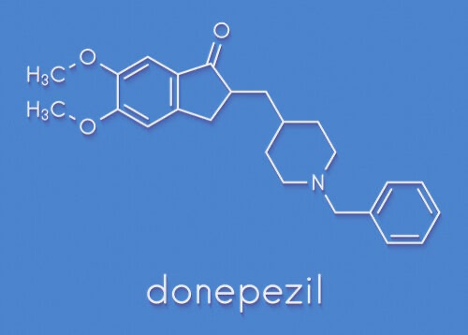Donepezil as a Treatment for Alzheimer's Disease

Donepezil is a drug for the treatment of Alzheimer’s disease. It was approved in Spain for this purpose in 1998. Donepezil is also marketed as Aricept or Yasnal. It doesn’t cure Alzheimer’s, which is a neurodegenerative and irreversible disease that has no cure. But donepezil helps treat the symptoms of this disease. Its goal is to improve the quality of life of patients with Alzheimer’s.
Donepezil as a treatment for Alzheimer’s disease
Donepezil is a specific and reversible acetylcholinesterase inhibitor. Acetylcholinesterase is responsible for breaking down the neurotransmitter acetylcholine. Therefore, its inhibition increases the levels of acetylcholine in different regions of the brain. In other words, it slows down brain destruction.
Acetylcholine affects memory and other cognitive functions. Experts discovered that Alzheimer’s disease decreases cholinergic energy by up to 95 percent. Thus, these acetylcholinesterase inhibitors are extremely useful, as they delay the onset of Alzheimer’s symptoms.
Acetylcholine is the most abundant neurotransmitter in the body. It’s present in the central nervous system as well as the peripheral nervous system. Increased levels of acetylcholine in the brain improve dementia. But an increase at the peripheral level can cause cholinergic side effects.

Alzheimer’s disease
Alzheimer’s disease is a neurodegenerative condition. It’s a neurological disorder that causes the massive destruction of nerve cells in the brain. These cells are cholinergic neurons. The disease causes different brain regions to waste away.
This process of destruction is caused by the development of amyloid plaques. These plaques are deposits that form around cells in the brain. They’re made up of a protein called beta-amyloid. In the case of Alzheimer’s, this protein is defective, triggering neuronal death.
One of the first symptoms is memory loss. As the disease progresses, cognitive and behavioral functions deteriorate, leading to dementia and eventually death.
Donepezil as a treatment for Alzheimer’s disease
Donepezil is suitable for the symptomatic treatment of mild to moderately severe Alzheimer’s disease.
Various studies showed its effectiveness in improving cognitive functions. It also improves the overall functional status of Alzheimer’s patients.
Treatment should always be prescribed and supervised by a medical professional. Donepezil is administered orally in a single daily dose. It should be given at night, before bed.
Initially, the daily dose is five mg a day for at least a month. Then after a clinical evaluation, the medical professional may consider an increase to 10 mg a day, also in a single dose. The greater the dose, the greater the therapeutic effects but also the greater the number and intensity of side effects.
Treatment with donepezil can be maintained as long as the therapeutic benefits continue. A clinical evaluation should be carried out periodically. If the results aren’t positive, the doctor may stop treatment.
According to some studies, donepezil it’s as effective as other acetylcholinesterase inhibitors. These include rivastigmine, galantamine, and, also, another inhibitor called memantine. which acts in a slightly different way. However, donepezil is the most widely prescribed.
Combined therapy with several of these drugs is also being studied for the treatment of dementia associated with Alzheimer’s. However, the risk of adverse effects increases if two acetylcholinesterase inhibitors are combined. But the combination of donepezil and memantine seems to give better results. More research is needed in this regard.

Side effects
The most important side effects of donepezil are:
- Diarrhea.
- Nausea.
- Anorexia.
- Fatigue.
- Insomnia.
- Muscle cramps.
- Headache.
Occasionally, some of these side effects mean the treatment has to stop. This often happens with adverse gastrointestinal reactions like nausea and diarrhea.

Generally, the side effects depend upon the dosage. Patients tolerate donepezil well at doses of five mg daily but presents more problems with a 10 mg dose. It’s important to frequently assess its effectiveness and adjust the dosage for each individual patient accordingly.
All cited sources were thoroughly reviewed by our team to ensure their quality, reliability, currency, and validity. The bibliography of this article was considered reliable and of academic or scientific accuracy.
- Agencia Española de Medicamentos y Productos sanitarios (2015). Ficha técnica. Aricept. [Online] Disponible en: https://cima.aemps.es/cima/dochtml/ft/61869/FT_61869.html
- Romano, M., Nissen, M. D., Del Huerto, N., & Parquet, C. (2007). Enfermedad de Alzheimer. Revista de posgrado de la vía cátedra de medicina, 75, 9-12.
- Portela Romero, M., Pombo Romero, J., Bugarín González, R., Tasende Souto, M., & Represa Veiga, S. (2005). Utilización de los inhibidores de la acetilcolinesterasa y la memantinapara el tratamiento de la demencia tipo Alzheimer. Revista española de salud pública, 79(6), 665-672.
- Rogers, S. L., Doody, R. S., Mohs, R. C., & Friedhoff, L. T. (1998). Donepezil improves cognition and global function in Alzheimer disease: a 15-week, double-blind, placebo-controlled study. Archives of internal medicine, 158(9), 1021-1031.
This text is provided for informational purposes only and does not replace consultation with a professional. If in doubt, consult your specialist.








